“The Walking Dead: The Ones Who Live” finale ending explained
- Oops!Something went wrong.Please try again later.
- Oops!Something went wrong.Please try again later.
- Oops!Something went wrong.Please try again later.
- Oops!Something went wrong.Please try again later.
Creators Andrew Lincoln, Danai Gurira, and Scott M. Gimple take us on set for that last scene.
Warning: This article contains spoilers about the season finale episode of The Walking Dead: The Ones Who Live, titled “The Last.”
The Walking Dead franchise often ends seasons with scenes containing big violent shockers (see Negan’s baseball bat at the end of TWD's sixth season) or by setting up what is to come next in the universe (the trip to a French lab at the end of World Beyond or the Rick and Michonne reintroduction as the mothership coda scene.) But the final scene of The Walking Dead: The Ones Who Live’s season (and perhaps series?) finale did something else entirely.
The finale began with Andrew Lincoln’s Rick and Danai Gurira’s Michonne on a mission to take down the CRM from the inside. And that they did. Rick finally got the Echelon Briefing from Major General Beale (Terry O’Quinn) and responded by stabbing the CRM leader in the chest. He and Michonne then rigged the toxic gas meant to take out Portland with explosives and detonated it outside of a military briefing, essentially zombifying the entire strike team. Michonne then took out the last remaining obstacle in their path by subduing CRM skeptic-turned-convert Thorne (Lesley-Ann Brandt) while explaining that “love doesn’t die.”
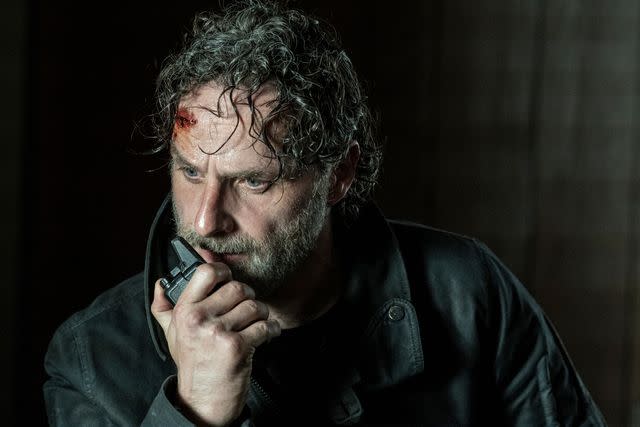
Gene Page/AMC
Andrew Lincoln on 'The Walking Dead: The Ones Who Live'Audio of a Civic Republic newscast informed us that Beale’s nefarious plans had been made public and there were new levels of oversight installed with free movement established within the Republic and new arrivals welcomed. And then came the reunion everyone had waited for, as Rick and Michonne walked off a chopper and were met by their children Judith (Cailey Fleming) and R.J. (Anthony Azor). It was a tender and moving moment, especially since Rick had not seen his daughter in more than six years and had never met his son.
Why did show creators Scott M. Gimple, Gurira, and Lincoln decide to end the season on such a sweet note? What was it like filming that big reunion? And why did pretty much everyone not named Rick or Michonne die along the way? We spoke to the three executive producers to get the inside story behind the finale and that final scene. (Also make sure to read our article on what they had to say about a possible season 2.)
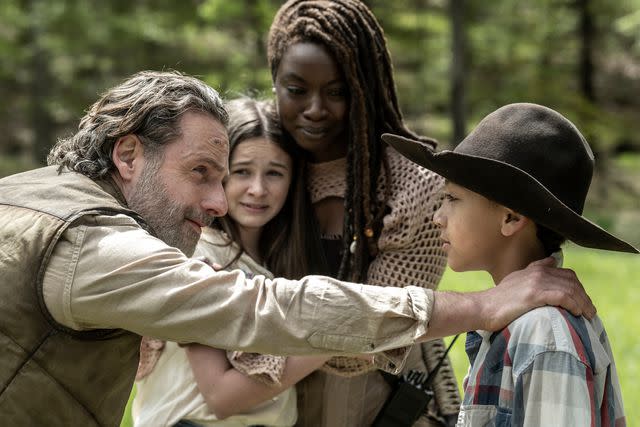
Gene Page/AMC
Andrew Lincoln, Danai Gurira, Cailey Fleming, and Anthony Azor on 'The Walking Dead: The Ones Who Live'ENTERTAINMENT WEEKLY: Tell me about deciding on this family reunion as the final scene. From very early on, did you guys knew it was going to end there, or did that develop as you had your discussions? How did you decide that's where you were going to end this story?
SCOTT M. GIMPLE: To my recollection, that was the ending and we were working on the journey to that. But I have horrible working memory and I have two people that were there with me, so I want to get a confirmation on that. I truly believe that that was always the ending and we were moving towards it. I don't think there was ever a world where either one of those characters didn't stay on with the other. I might be wrong.
DANAI GURIRA: It definitely was that we were journeying towards that ending. There was definitely never an idea of like, "Oh, let's let it be a tragic ending." That was not on the table, I don't think at any point. It was always like, how do we get them together? How do we bring Rick his happy ending, and Michonne her happy ending? That's what I recall.
ANDREW LINCOLN: Yeah. I think it would've been a bit of a gut punch if we'd done six episodes, got everybody back, and then killed them both. I mean, that would've been a bit rude.
Well, you guys pretty much killed everyone else. I mean, you guys offed Okafor, Beale, Nat, Thorne, Jadis….
GIMPLE: Yeah, you're right.
LINCOLN: That is true.
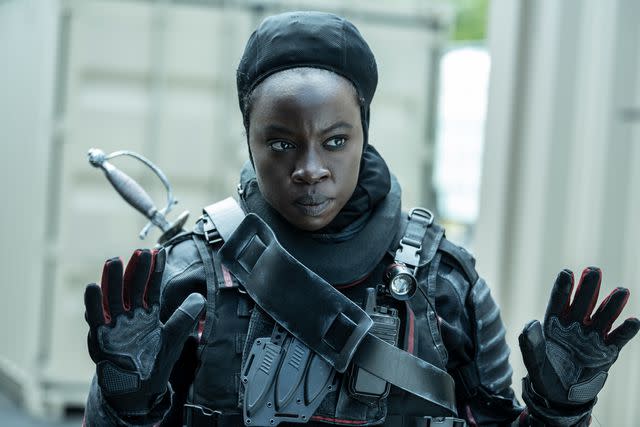
Gene Page/AMC
Danai Gurira as Michonne on 'The Walking Dead: The Ones Who Live'Was that by design, to up the body count? In the last few seasons of The Walking Dead, we didn't see as consistently as big a body count as we saw here on this show.
LINCOLN: I think we sort of backed ourselves into a corner, really. I think the whole gas idea, we just relied on Scott to work out.
GIMPLE: I will say that so many characters died along the way because it was a story about Rick and Michonne, and it was so focused on them, it didn't seem like we could serve them. Further, the deaths of those characters individually affected Rick and Michelle so deeply. So those deaths, they were not for shock value or body count. It was a little bit more aspiring to Joseph Campbell stuff.
LINCOLN: But you also did want an army of the dead.
GIMPLE: As far as the army, the gas was very much about that.
Speaking of people you killed off… Danai, you had your big fight scene with Lesley-Ann Brandt as Thorne. You've talked about how this being a love story was really important to you, so tell me about sort of capping that off with the “love doesn't die” line.
GURIRA: Well, firstly, I was very annoyed with that little poker I had to use versus my sword. That's just a wound I will eternally carry about our finale, so just putting that out there. But Gimple said this the other day, that Lesley-Ann did such a great job as Thorne and that she represented the Shane thing, even though she does come to a redemptive place at the end, which Shane kind of doesn't.
So it's that sort of idea of these very differing perceptions of how the world works, and the idea that no matter what's happened, no matter what we've gone through, no matter what has been experienced, our love, if anything, got stronger. So it doesn't die, it doesn't get diminished by the world's circumstances or by any dilemmas or traumas that come our way. It has stood the test of time. That's her belief system, and it's proven itself to her.
Thorne is a casualty, a fatality of the system. She bought into a system that Rick and Michonne could not and would not, and that's a result of those two very differing ideologies at the end. Consequently, it results also in Thorne's demise and Michonne's getting back to her love. So yeah, it's a crux of the whole ideology that is pairing that shown through.
I thought she was going to be the one to actually make it out alive, but you all killed her like you killed everyone off. I guess maybe Esteban is still out there somewhere, but that's about it.
GIMPLE: I mean, the title is The Ones Who Live.
LINCOLN: We should have just said We're the Only Ones Who Live.
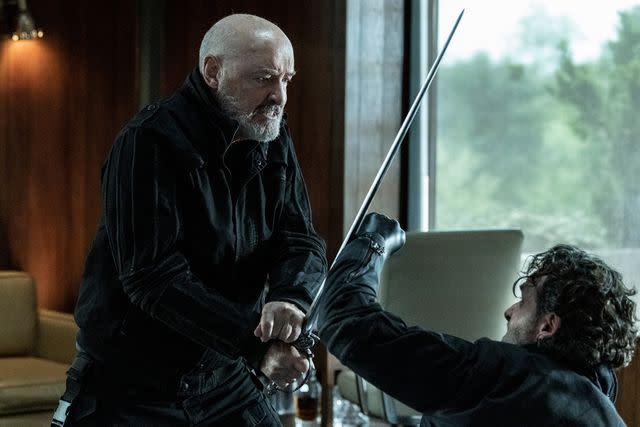
Gene Page/AMC
Terry O'Quinn and Andrew Lincoln on 'The Walking Dead: The Ones Who Live'Andy, tell me about filming this big scene with Terry O’Quinn with him giving you the lowdown on their plans and then the fight scene that finishes it off.
LINCOLN: I loved it. The reason why I came across to this country [was] to work alongside and to learn from people like him, and it was just a joy. As you know, he's one of the sweetest, coolest dudes I've ever met. We bonded on Joni Mitchell, randomly. He's got the most beautiful singing voice, and he plays the guitar. He's just one of those dudes, and he walks up with 43 pages of monologue, nails it every time. Then you have a couple of anecdotes in between sets, and off he goes again.
He allowed me to bruise his skin terribly with a fake sword, which I felt really sad about. He had really bad bruising the next day, and I felt terrible. We thought he wasn't going to do that much fighting, and he was absolutely game for all of it. He's a maniac and I love him to bits. I think we couldn't have wished for a better person to be charismatic, conflicting, a pragmatist, but also just a little unhinged. He sort of threaded the needle of all of those so perfectly.
The series is called The Ones Who Live and we know the importance of that line, but I heard another line repeated a few times in this episode, "This is the s--- we do." What's the significance of that line, because it seemed to be play a big role in this episode?
GIMPLE: Both of them do absolutely insane things, and it's an incredibly fun part of these characters. It's also a dark part of these characters. It's also a crazy part of these characters. They do insane things, but nine times out of 10, it's on behalf of others. That is something that both characters individually have always had in common. Then you put them together and they're insane on a grand scale, which they were this episode.
Both of them have very parallel experiences in this episode, but they were faced with the same question, which is, "People are going to die. What are you going to do?" But they both had the exact same answer, because they have the same soul.
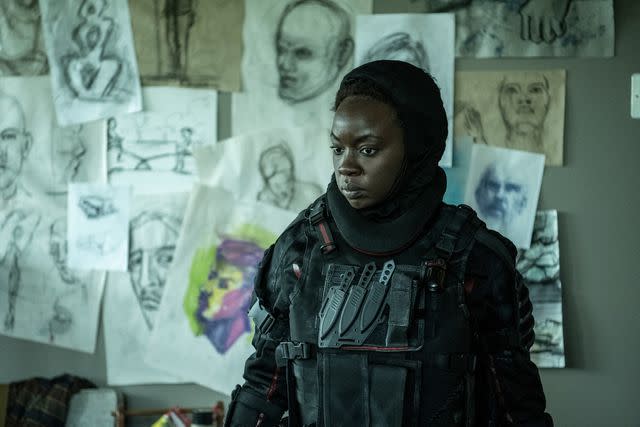
Gene Page/AMC
Danai Gurira as Michonne on 'The Walking Dead: The Ones Who Live'I want to get back to the final scene. I know Scott was on strike then so couldn’t be on set, but Andy and Danai, what it was like filming that final scene? Take me on set for that day.
GURIRA: It was a very awesome day. It was also intense. I was very happy for both characters, interestingly, and I thought it was very special. There was something awesome about seeing both Cailey and Anthony. Anthony, he's a lovely young man. He can be very reserved, but he really opened up with Andy, which was really special to see. It was perfect.
For the character of R.J., this guy's been looming around like this absent father. And as an actor, he’s never met him. Anthony was really fascinated by him, and was joking on him and giving him a hard time. There was just a really great rapport they had, which was kind of poetic. I just saw him open up in a way I've never seen, so that was really, really special.
Cailey's always fantastic and just right on the money and she's always so incredible to be around. So it was a really great day. It was an emotional day in the sense that I wanted it to be a great day for our characters and it really turned out to be, so it was an intense day in a good way.
LINCOLN: Yeah, It was wonderful. The last time I saw Cailey, I was high-fiving her in the trailer for The Walking Dead as I was leaving season 9 and she was just joining. Then I see how accomplished an actress she is. She was just, as Danai said, every single take, so grounded, so moving. There's always an expectation of the last scene, the last line, just to make sure that we were focused and enjoying ourselves and quite free — that was really important.
I think Anthony saw through my beard and realized that I was more of a child than he was, and probably that's why we got on quite well. But it was a lovely day after quite an exhausting shoot. It was towards the end. It was one of those wonderful scenes and it's something that we've spoken about for years, that reunion, so it was glorious to finally do it.
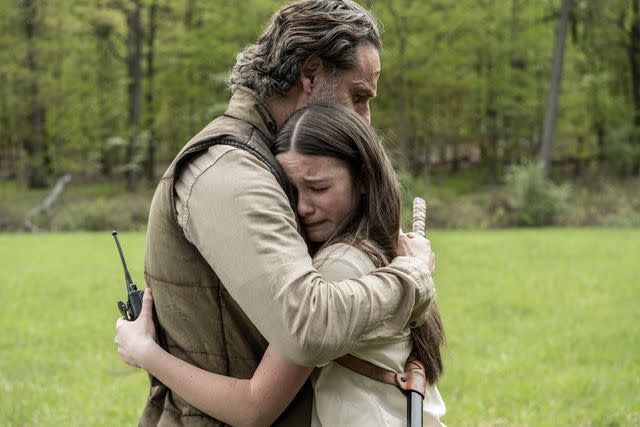
Gene Page/AMC
Andrew Lincoln and Cailey Fleming on 'The Walking Dead: The Ones Who Live'We've talked a lot about what it was like coming back to the role after being away for a few years, but what did it feel like after you wrapped these six episodes?
GURIRA: We were so exhausted that it was just about sort of getting your bearings back, a lot of that. But we were so deeply involved almost right away in some degree of post-production. I remember my last day I just had to do some little tiny things, but I wanted to finish with Andy, so I was getting sentimental near the end. Andy's like, "What's the big deal?" I'm like, "No, I want to finish on the same day," so I came back and did some really unnecessary inserts. I mean, they were necessary, but they could have been done another day. Then I was just in the parking lot having a cookout with the crew and smoking cigars, while Andy was stuck.
LINCOLN: I had to f---ing cut my hand off again while you were partying in the trailer with most of the crew.
GIMPLE: Andy was being moved from one intense scene to the other intense scene to the other. It was emotional ping pong.
GURIRA: That was the day they were telling him he had to cry into a letter and he was writing.
LINCOLN: Yeah, that's right. They said, "We want seven tears onto the camera lens now."
GIMPLE: You were cutting off your hand, you were stabbing walkers in a fury building up to an emotional explosion, and then yeah, you were weeping over a letter.
GURIRA: I was literally smoking cigars. It was really funny.
LINCOLN: You were smoking cigars and having drinks.
GURIRA: Eating pizza and champagne. I felt bad for him. I was having a blast.
GIMPLE: I was picketing in New York, so a wild array of experiences.
LINCOLN: It was a wild ride.
This interview has been edited for length and clarity.
Sign up for Entertainment Weekly's free daily newsletter to get breaking TV news, exclusive first looks, recaps, reviews, interviews with your favorite stars, and more.
Related content:
The Walking Dead: The Ones Who Live creators on future of the show
Andrew Lincoln and Danai Gurira go deep on The Walking Dead: The Ones Who Live sex scene
On set for the Rick and Michonne reunion in The Walking Dead: The Ones Who Live
The Walking Dead: The Ones Who Live creators on helicopter cliffhanger
Andrew Lincoln explains The Walking Dead: The Ones Who Live premiere shocker
Read the original article on Entertainment Weekly.

